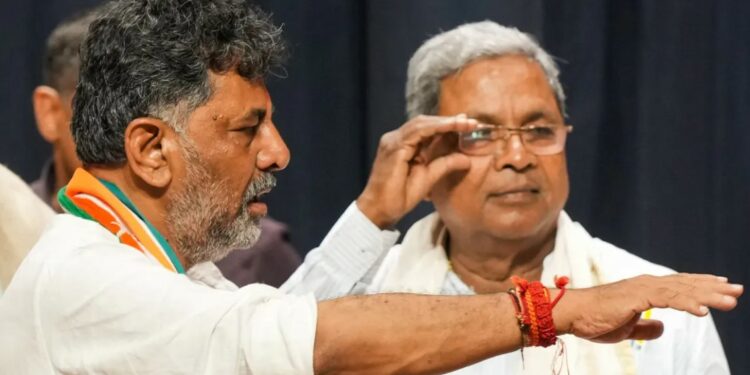The political drama in Karnataka seems to have found some resolution with D K Shivakumar finally yielding to pressure from the high command and allowing arch-rival Siddaramaiah to assume the coveted Chief Minister’s seat in the state. In the recent elections, the Congress secured a significant victory, winning 136 out of 224 seats, nearly rendering the BJP irrelevant in their lone stronghold in the South.
This victory can be attributed to the strategic thinking of one man, D K Shivakumar. While he praised Sonia Gandhi and other members of the Gandhi family, Shivakumar fell out of favor with them when it came to deciding the Chief Ministerial candidate. Half-heartedly accepting the Congress’s decision, Shivakumar plans to closely monitor developments and seize the opportunity to claim the CM position if it arises.
Shivakumar has been granted the Home portfolio, along with other important sections of governance. According to reports, the Congress party will accommodate Shivakumar’s demand for greater inclusion of his supporters in key ministerial roles. Following discussions at 51 Lodhi Road, Shivakumar stated to the media that he accepts the Congress’s decision as final, akin to a court ruling.
However, walking the talk may prove challenging as the Lok Sabha elections are just around the corner in May. History has shown that Karnataka tends to vote in favor of the saffron party during parliamentary elections, potentially jeopardizing Shivakumar’s aspirations. In such a scenario, he may exert pressure on the Congress leadership to secure the CM position for himself, ousting Siddaramaiah.
The Congress party’s manifesto in Karnataka promised various populist measures, including Rs 2000 for women homemakers and 200 units of free electricity for every household. However, the party leadership is well aware of the challenges involved in fulfilling these promises. Implementing such commitments will require significant efforts, especially considering the expected lackadaisical response from government officials.
If the government delays or fails to deliver on these promises, it could result in a shift of voter sentiment towards the BJP in the next elections. According to Sonia Gandhi’s statement, Siddaramaiah will have a two-year tenure as CM, with the remaining three years earmarked for D K Shivakumar. However, the recent example of Rajasthan and the internal strife between Sachin Pilot and Ashok Gehlot provide a broader picture of what may await Karnataka in the coming months.
As the new government assumes office, all eyes will be on Siddaramaiah’s administration and the ability of the Congress party to deliver on its promises. The road ahead may prove challenging, with political rivalries and the imminent Lok Sabha elections posing significant obstacles. Only time will tell if Karnataka’s political landscape remains settled or if further turbulence lies ahead.


















Discussion about this post